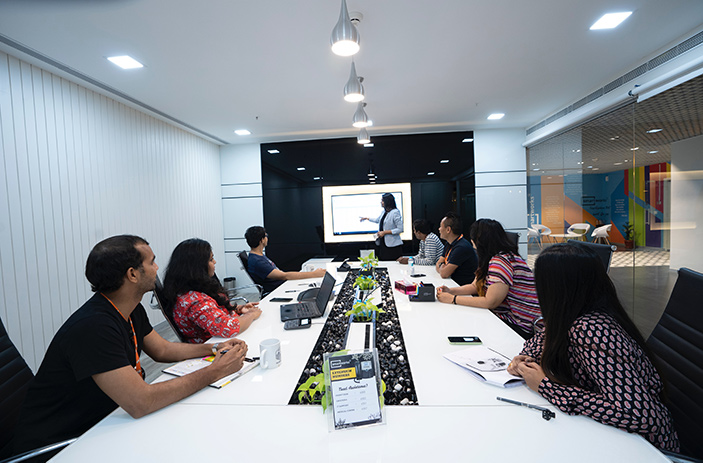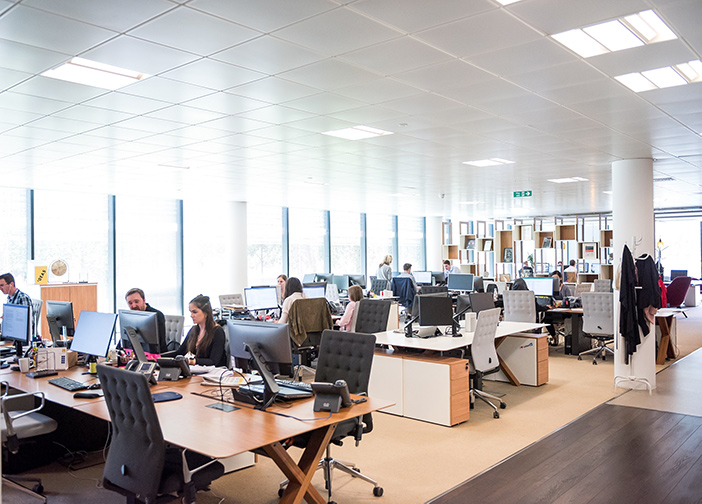Making The Office Appealing Again:
The Role And Importance Of Tech
 By Richard Morris, Director at technologywithin.
By Richard Morris, Director at technologywithin.
With workers reticent to return to the workplace, businesses are searching for ways to enhance the appeal of the office. Richard Morris, Director at technologywithin, outlines why tech will be so important in proving that the office really is a better workplace than home.
For workers to want to return, the office now has to offer an obvious upgrade on working from home. Indeed, 85% of working adults currently working from home would like to continue doing so in some form even after the Covid crisis subsides.
But this apparent preference has actually caused huge uncertainty for businesses, nearly a third of whom are unsure what proportion of their workforces really will return to their office when lockdown restrictions start to ease.1
Businesses therefore want and need to not just “encourage” workers to return to the office, but reignite their affinity for such workspaces.
Tech will be crucial to any efforts to do so.

Poor Connectivity = Poor Productivity
Rapid, reliable internet connection is an absolute must for the post-pandemic office if workers are to be attracted back. Inadequate connectivity is among the biggest barriers to working well from home, costing workers as much as 72 minutes per working day. In contrast, a well-connected office can provide a platform for both workers and businesses to bounce back strongly from the pandemic.
Nowadays, prospective tenants require reassurance and guaranteed service speeds on dedicated internet bandwidth. This means that leaving multiple occupants, as in flexible workspace, to fend for themselves on a shared connection will dramatically undermine a space’s marketability. Facilities managers should instead capitalise on businesses’ insistence on robust connectivity, and their preparedness to pay for the privilege.
Embracing AI
Facilities managers should also seize the opportunity to enhance their offices with smart systems which can control environmental factors such as lighting, heating, and air conditioning. Working from home has driven a significant increase in workers’ health complaints, from the mental to the musculoskeletal, whereas an office equipped with these intelligent facilities management platforms can lead to happier, healthier, and more productive workers.
With 80% of respondents telling a Nuffield Health survey that home working in 2020 had negatively impacted their mental health, AI-enabled digital infrastructure will therefore also be key to supporting workers’ wellbeing. Offices equipped with this tech can optimise environmental conditions, improving the experience of workers, a third of whom said that better lighting, for example, would make them happier at work, even before the pandemic.2

High-Spec Hybrid Working
Now is also the time for facilities managers to invest in cutting-edge videoconferencing solutions, which will provide an attractive alternative to lone laptop-based communication. Rather than letting “you’re on mute” become the mantra of the post-pandemic meeting, market-leading platforms will enable colleagues to collaborate effectively despite geographical distances between them as company workstyles become more fluid.
As a result, these videoconferencing applications will ensure a smoother transition to truly flexible hybrid work strategies, which are understandably growing in popularity among workers. And with home workers consistently citing the difficulty of collaboration as the greatest downside of working from home, it is vital that offices enhance their superior suitability with the best available tech.
Creating Community
All these new facilities will need managing effectively to ensure that returning workers can make the most of them. Easy-to-use booking platforms will help facilities managers ease the transition back to physical meeting rooms, freeing businesses to focus on rebuilding those all-important working relationships which have frozen over with everyone at home.
Meeting in person is crucial to company culture and early-career learning, with 74% of young people reporting feelings of loneliness while working from home.3 This has considerable implications for the office market, with businesses increasingly aware that retaining top talent will rely on offering in-person development opportunities. To remain competitive, therefore, facilities managers should ensure that their premises can support these ambitions.

Where’s The Better Workplace?
Ultimately, facilities managers should ensure that their offerings leave tenants in no doubt as to the answer to this question. Robust connectivity, AI-enabled infrastructure, high-spec videoconferencing solutions, and seamless space management platforms will all be crucial to convincing workers that they can indeed be happier, healthier, and more productive when returning to the office.
Indeed, there is a mounting body of evidence highlighting how much workers really need the office – but facilities managers should also be aware that the office, in turn, needs tech.
1: https://www.ons.gov.uk/employmentandlabourmarket/peopleinwork/employmentandemployeetypes/articles/businessandindividualattitudestowardsthefutureofhomeworkinguk/apriltomay2021
2: https://www.staplesadvantage.co.uk/get-inspired/workplace-health-and-hygiene/a-brighter-better-workspace-how-smart-lighting-can-transform-your-office/?browse=1
3: https://www.totaljobs.com/advice/lockdown-loneliness-the-collapse-of-social-life-at-work#the-cost-of-lockdown-loneliness
Click the article to enlarge it.























































